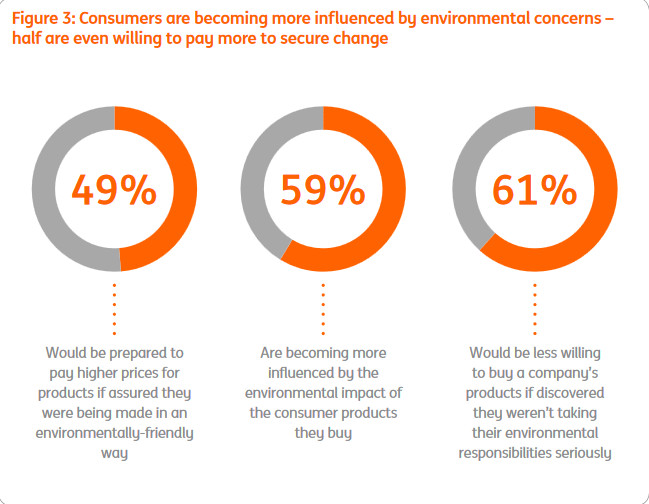Research carried out by ING considers the circular economy from the consumer’s perspective, a companion piece of research to earlier surveys of US firms and reveals a movement against unsustainable brands.
The research demonstrates that consumers are increasingly concerned about their environmental impact, including that of the companies they are buying from, and are willing to walk away from brands they consider not to be sustainable.
Globally, 49 per cent of consumer would be willing to pay a higher price for goods if they could be certain that they were manufactured in an environmentally-friendly way, and 61 per cent would be actively discouraged if they were aware that the manufacturer was not environmentally sound.
However, while consumers’ sustainability concerns are translating into action, this often involves taking the path of least resistance, such as through buying decisions and convenient options like recycling. Only a small minority engage in actions that require additional effort on their part, whether that be repairing, renting, or adopting reusables.
The barriers to progress are identified as in awareness and education, lack of empowerment and reassurance (that comes from education and information), a lack of circular infrastructure and, of course, cost. All barriers that might be addressed by positive action in the near future.
Isabel Fernandez, member of the management board and global head Wholesale Banking noted in the introduction to research: “In 2017 I had the opportunity to participate in the World Circular Economy Forum in Helsinki. At the time, I said that as a financial institution, we have a moral obligation to help society progress in a sustainable way – a point I still stand by today.”
Full research here.
Latest News
-
Building Society donates £25,000 in retrofit funding to cricket club
-
CSR body set up by King Charles III names next chief executive
-
Hotel to fundraise for hospice charity
-
Tech firm supports world’s only football club for women with Parkinson’s Disease
-
Campaigners want to see 1,000 more employers introduce payroll giving
-
Hospice charity and AI firm launch five-year partnership
© 2019 Perspective Publishing Privacy & Cookies









Recent Stories